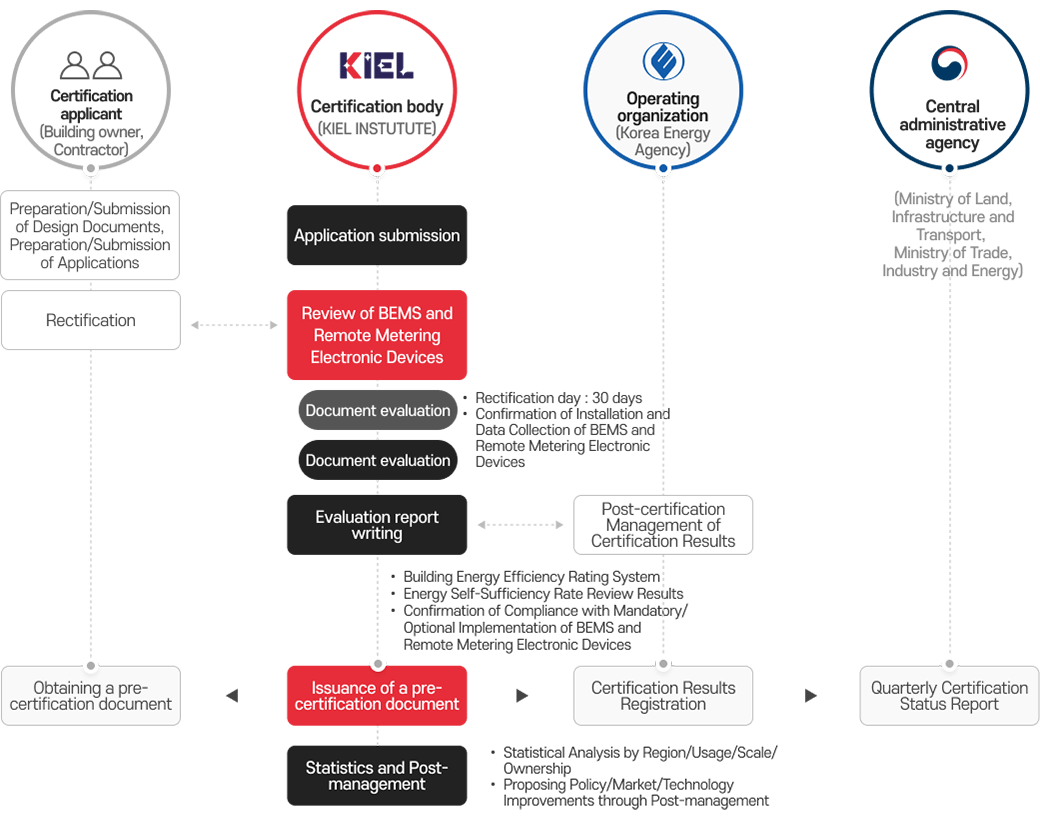Zero Energy Building Rating System
Zero-Energy Building Certification is awarded to green buildings that minimize the energy load required for buildings and minimize energy consumption by utilizing new and renewable energy sources. The certification is based on the energy self-sufficiency rate, ranging from Grade 1 to Grade 5
Certification targets
- Buildings eligible for building energy efficiency rating system, where the building owner applies for zero-energy building certification.
- (Mandatory) Public buildings subject to the submission of energy-saving plans for additional construction with a floor area of 500m² or more, constructed separately on the site of new construction, reconstruction, or existing buildings, are required to display the certification mark for buildings subject to mandatory certification.
Certification grade
Buildings that meet the criteria of Building Energy Efficiency Rating 1++, achieve a self-sufficiency rate of 20% or more, and comply with the installation standards for Building Energy Management Systems (BEMS) or electronic telemetering system is awarded based on the self-sufficiency rate, ranging from Grade 1 to Grade 5.
-
01
Building Energy Efficiency Grade 1++ or above
Building Energy Analysis Program (ECO2) Evaluation
- For residential buildings: Below 90 kWh/(m²·year)
- For non-residential buildings: Below 140 kWh/(m²·year)
- Evaluation of Cooling/Heating/Hot Water/Lighting/Ventilation Consumption and Renewable Energy Production
- Primary Energy Consumption (kWh/(m²·year)) = Specific Energy Consumption by Use x Primary Energy Conversion Coefficient
-
02
Energy self-sufficiency rate of 20% or more
Building Energy Analysis Program (ECO2) Evaluation
- Building Energy Efficiency Grade Certification
- Energy Self-Sufficiency Rate Review Results
- Evaluation of Cooling/Heating/Hot Water/Lighting/Ventilation Consumption and Renewable Energy Production
- Energy Self-Sufficiency Rate (%) =
Unit Area Primary Energy Production kWh/(m²·year) Unit Area Primary Energy Consumption kWh/(m²·year)X 100
-
03
Installation of BEMS or remote metering electronic devices
Assessment of Applicability for Each Checklist Item
- System for Measuring and Managing Energy Consumption in Real-time
- (BEMS) Evaluation of 9 items including data collection and display, information monitoring, and control system integration
- (Remote Metering) Evaluation of 6 items including data collection and display, instrument management, and data management (additional recommendation of 3 items)
-
GradeEnergy Self-Sufficiency Rate
-
1Buildings exceeding 100%
-
2Buildings ranging from over 80% to less than 100%
-
3Buildings ranging from over 60% to less than 80%
-
4Buildings ranging from over 40% to less than 60%
-
5Buildings ranging from over 20% to less than 40%
Certification Procedure
Document evaluation is conducted based on the design documents, and on-site assessment is carried out for self-verification.


Incentive
- (Relaxation of Building Standards) Up to 15% relaxation in site coverage, building height, and other building standards.
- Maximum 20% reduction in acquisition tax for buildings or homes.
- 20% increase in the housing fund loan limit for homes.
- Additional points for renewable energy installation grant.
- Financial support for rational energy use (support for part of the long-term loan for energy efficiency-related equipment investment).
- Up to a 15% reduction in the contribution rate for the construction of infrastructure for housing projects.
- Up to 100% reduction in certification fees for building energy efficiency rating system for private buildings not subject to mandatory certification.
Related guidelines
- Article 17 of the Green Building Construction Support Act
- Article 12 of the Enforcement Decree of the Green Building Construction Support Act
- Rules regarding the certification of building energy efficiency grades and zero-energy building certification (Link)
- Criteria for the certification of building energy efficiency grades and zero-energy buildings (Link)
- Regulations on the rationalization of energy use in public institutions
- Standards for energy-saving design of buildings
Enquiry
Green Energy Department, Building Energy Team, Chief Research Engineer, Ahn, SangMin
Tel
+82-32-670-3873
Fax
+82-70-7611-2526
asm@kiel.re.kr



